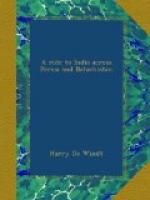An easy ride, through a pretty and fertile country, brought us to the telegraph-station of Konar Takta, where Mr. E——, the clerk in charge, had prepared a sumptuous breakfast. But we were not destined to enjoy it. They had, said Mr. E——, experienced no less than nine severe shocks of earthquake the night before, one of which had rent the wall of his house from top to bottom. His wife and children were living in a tent in the garden, and most of the inhabitants of the village had deserted their mud huts, and rigged up temporary shanties of palm leaves in the road. “We will have breakfast, anyhow,” continued our host. “You must be hungry”—leading the way into the dining-room, where a long, deep crack in the whitewashed wall showed traces of last night’s disaster.
The latter had, apparently, considerably upset my host, who, throughout the meal, kept continually rising and walking to the open window and back again, in an evidently uneasy state of mind; so much so that I was about to propose an adjournment to the garden, when a diversion was created by the entrance of a servant with a dish of “Sklitch,” which he had no sooner placed on the table, than he rapidly withdrew. Sklitch is peculiar to this part of Persia. It is made of a kind of moss gathered on the mountains, mixed with cream and dates, and, iced, is delicious. But scarcely had I raised the first mouthful to my lips when my host leapt out of his seat. “There it is again,” he cried. “Run!” and with a bound disappeared through the window. Before I could reach it the floor was rocking so that I could scarcely keep my feet, and I was scarcely prepared for the drop of nine feet that landed me on to the flower-beds. The shock lasted quite ten seconds. Every moment I expected to see the house fall bodily over. I left poor E—— busily engaged in removing his instruments into the garden. “Another night like the last would turn my hair grey,” he said, as we bade him good-bye. Truly the lot of a Persian telegraph official is not always a bed of roses.
A gradual descent of over two thousand feet leads from Konar Takta to the village of Dalaki, which is situated on a vast plain, partly cultivated, the southern extremity of which is washed by the waters of the Persian Gulf. There is a comfortable rest-house at this village, the population of which is noted as being the most fierce and lawless in Southern Persia. Rest, though undisturbed by earthquakes, was, however, almost out of the question, on account of a most abominable stench of drainage, which came on at sunset and lasted throughout the night. So overpowering was it that towards 3 a.m. both Gerome and myself were attacked by severe vomiting, and recurrence was had to the medicine-chest and large doses of brandy. One might have been sleeping over an open drain. It was not till next day that I discovered the cause—rotten naphtha, which springs in large quantities from the ground all round the village. Curiously enough, the smell is not observable in the daytime.




